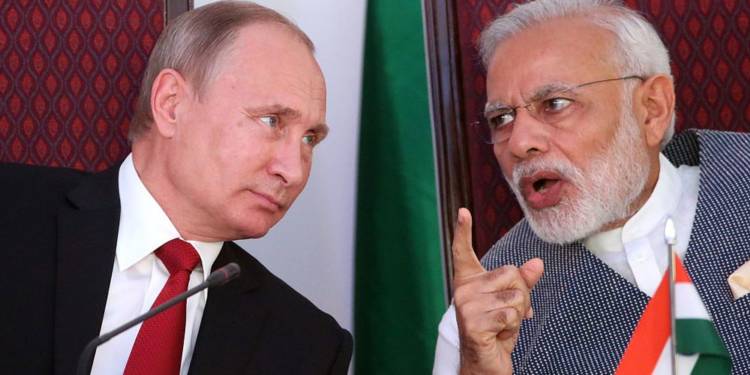The year 2020 has seen an abundance of firsts and the biggest, amongst the lot has been the latest news of the postponement of the India-Russia Annual summit. Analysts have suggested the decision to postpone the meet comes in the backdrop of Russia casting its aspersions over New Delhi pledging its allegiances towards the QUAD and siding more and more with the USA.
India and Russia have been holding the annual summit, which is the highest institutionalized dialogue mechanism in the strategic partnership, since 2000 when the ‘Declaration on the India-Russia Strategic Partnership’ was signed between both sides. Last year, Prime Minister Narendra Modi had visited the far east region of Vladivostok for the meet where he signed several successful and important MoU’s. A year earlier, in October 2018 Putin had visited New Delhi for the 19th edition of the summit.
Both New Delhi and Moscow have varied definitions of Indo-Pacific and despite India’s insistence on Putin to join the march against China in the region, the Russian President has been apprehensive about the said prospect.
It is not as if Russia and China are thick as thieves. Both Xi Jinping and his vile CCP have been eyeing Russia’s resource-rich far-east region and have on numerous occasions tried to breach the borders.
Vladivostok is itself a matter of Sino-Russian tensions, as Chinese wolf-warriors have in the recent past staked claim upon the Russian Far East Capital. Hu Xijin, Editor-in-Chief of the Chinese Foreign Ministry tabloid, Global Times even chose to call Vladivostok by the Chinese pseudonym- Haishenwei. Russia itself responded to Beijing’s illegitimate ambitions in the Russian Far East by stepping up its military presence in the region.
While Putin is still not done with China despite the differences between them, but, his animosity towards the USA is seeping into the relations with India. Moscow is calling out India for its ties with the US, and as it turns out, New Delhi hasn’t taken the statements lightly. On the contrary, it has hit back at Moscow in a measured tone.
Foreign Minister Sergey Lavrov earlier this month had slammed the concept of Quad and called India for falling prey to the USA’s pressure tactics.
“India is currently an object of the Western countries’ persistent, aggressive and devious policy as they are trying to engage it in anti-China games by promoting Indo-Pacific strategies, the so-called Quad while at the same time the West is attempting to undermine our close partnership and privileged relations with India. This is the goal of the US’ very tough pressure on New Delhi in the MTC (military and technical cooperation) area,” Lavrov had said.
However, India was quick to counter the ill-informed statements of Lavrov, and Ministry of External Affairs spokesperson Anurag Srivastava released a statement two days later.
“India has always pursued an independent foreign policy based on its national interest. India’s relationship with each country is independent of its relations with third countries. We hope that this is well understood and appreciated by all our partners,” said MEA spokesperson Anurag Srivastava.
It is imperative to note that India was one of the first countries to pioneer the virtual bilateral summit concept after the pandemic hit the world when PM Modi and Australian PM Scott Morisson conversed earlier in June this year. Therefore, if New Delhi was inclined, it would have called for the virtual summit as well.
Read more: Containing the Chinese threat: Navies of India and Australia all set to access each other’s ports
But by the looks of current developments, it seems as if the Modi government is giving a cooling-off period to the Putin regime to come around the fact that India is here to stay in the QUAD.
The QUAD which was always an informal alliance has metamorphosed itself into a military alliance this year. While China is visibly flabbergasted at the developments, Russia is slightly apprehensive at the prospect of its rival USA coming close to its shores.
Given that India and Russia have been natural allies for decades, there is no doubt that the slight miscommunication regarding India’s need for QUAD will be ironed out in the near future. But until then, New Delhi has shown that it is a firm diplomatic country that can hold its end and even give a little rap on the knuckles to its friends to assert dominance, once in a while.
